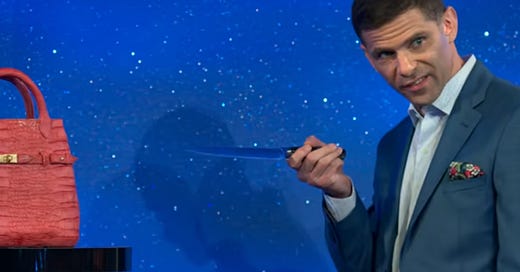GUEST WRITER SOPHIE LEWIS: The Cake Phase of the Commodity-Form
A witch-dunking pageant for consumer comestibles
A GUEST WRITER THIS WEEK. VERY EXCITING.
Here, friends, is Sophie Lewis, known for many things including correct opinions about that octopus movie. She is a fantastic writer and also, it must be said, deeply weird. I am honored to feature her, writing about Netflix’s Is It Cake?
The Cake Phase of the Commodity-Form
I can’t say I honestly blame Karl Marx f…
Keep reading with a 7-day free trial
Subscribe to The Real Sarah Miller to keep reading this post and get 7 days of free access to the full post archives.




